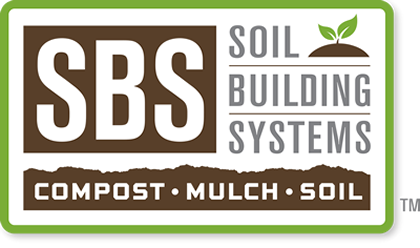<< Back To SBS Blog
Topic: Why is Compost Important?
We are told at one point or another to add compost to our gardens and landscapes, but why? Why should anyone add compost to their existing landscape? Here’s why. First, we need define what compost is exactly. According to Merriam-Webster, compost is “a mixture that consists largely of decayed organic matter and is used for fertilizing and conditioning land”. Compost sounds simple enough and has really interesting benefits of fertilizing and conditioning the land. Let us explore both of those two topics further. Compost as a soil conditioner. To begin, compost as a soil or “land” conditioner. A fully finished compost contains some of the macro and micro nutrients plants need for survival, but they also contain microbes for soil biology. Believe it or not, all soil is a living system! Native soils contain naturally occurring microbes that are extremely active in the decomposition process of green material (leaves, fallen branches, etc.) and in turn feed the soil to make it nutrient rich for other living organisms, such as plants, to survive. Adding compost to existing soil adds new microbial biology that keeps the soil active providing nutrients to plant life both by the compost itself and the biology as it decomposes in the soil. As one can see, it is beneficial for the soil to have compost added. Now, if you are more synthetic in the way you garden, you may not have as active microbial activity opposed to those who are more organic in the way they garden. Don’t fret, you can still reap the benefits of compost. Compost as a fertilizer: Compost can be used as a slow release fertilizer in the landscape. Keep in mind, compost is rarely ever labeled as a fertilizer even though it can be used as such. As stated before, finished compost contains some of the macro and micro nutrients plants need for survival. When compost is applied it acts as a slow feed as it continues to decompose. Granted, compost is not as quick to show results as a synthetic fertilizer, compost is the more earth friendly of the two. In addition, compost will help transform the otherwise stagnant soil by introducing biological life back in, which fertilizer cannot accomplish. Fertilizer is a short-term fix, and is commonly misused and causes plants to become more and more dependent on the next nutrient blast, kind of like a synthetic fertilizer junkie. Compost on the other hand is one of the organic options for those looking to reduce pollutants in landscapes and water systems. Compost may be applied as a top dressing to lawns and landscapes leaching nutrients to plant roots. Compost can also be tilled into landscape beds making nutrients available directly at the plants root system. These are the most common ways compost can be used as a fertilizer. Why haven’t you added compost to your landscape? There are benefits to adding compost to your landscape as a soil conditioner or as a fertilizer. There is a beauty to using compost and how it works with the natural biology of soil. If you have not already added compost to your landscape, go for it! It is for the health of your landscape. What different ways have you used compost in the landscape?
